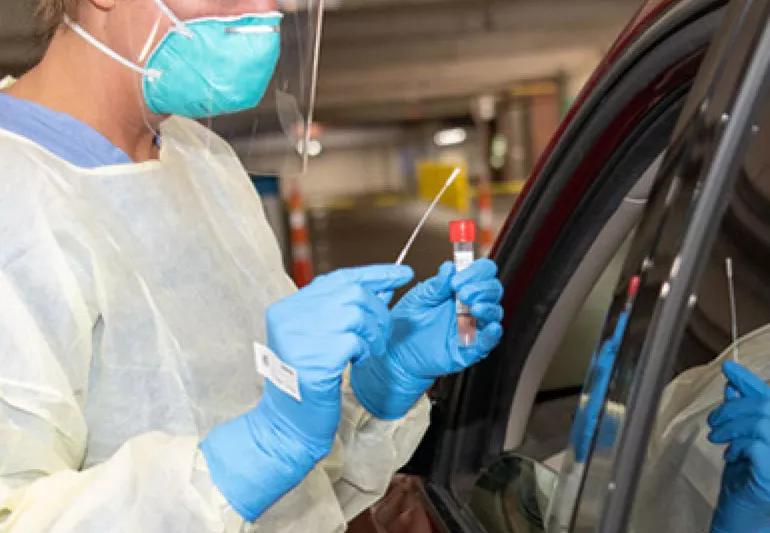You have all the symptoms, but here’s why you still might not get tested

Image content: This image is available to view online.
View image online (https://assets.clevelandclinic.org/transform/81bba882-ac47-45c1-b403-e439ecdcfbc9/covidTesting-COVID-1871569-032020-770x553-1_jpg)
Nurse taking swab from patient to test for COVID-19
As more cases of COVID-19 are reported, guidelines on who should be tested are constantly changing. For some people, the inability to get tested has left them feeling frustrated, especially when they’re experiencing symptoms.
Advertisement
Cleveland Clinic is a non-profit academic medical center. Advertising on our site helps support our mission. We do not endorse non-Cleveland Clinic products or services. Policy
“In the beginning of all this, it was all about who could do the test,” says infectious disease specialist Frank Esper, MD. “Then it was about who has enough machines, viral media or swabs. It’s these issues that have led to limitations in the number of tests we can perform. For now, we have to be very deliberate as to who we test and why we’re testing them.”
In general, lack of testing, despite symptoms, is a direct result of not having enough materials needed to perform the tests.
Because of this, most health systems have had to prioritize testing.
Every state and hospital is different, but most have put together testing guidelines about who should get tested and under what circumstances. Right now, COVID-19 testing is focused on high-risk patients.
This means that patients should be symptomatic and fall into one of several categories, which often includes:
Advertisement
Testing is done to help determine if being positive for coronavirus should change a person’s course of treatment.
No doubt, this can be aggravating for people who don’t fit the criteria to get tested, but are still sick and experiencing symptoms.
But, there is a silver lining. According to one report, about 80% of those with COVID-19 will have mild to moderate symptoms and make a full recovery.
“For those who have a cough and fever and maybe they’re at home on the couch – those people probably won’t be tested at this point in time,” explains Dr. Esper. “And they don’t need to be. The majority of people will recover just fine, even without a test.”
It’s also important to point out that we’re still in cold and flu season (and a particularly bad one at that). You might be sick with regular, run-of-the-mill influenza rather than coronavirus.
But test production and accessibility is ramping up. Right now, not everybody is going to be able to get tested, but we’re increasing the number of tests that we do each and every week, says Dr. Esper. Eventually we want to get to a point of being able to offer a test to everybody who may be infected, but we’re just not there right now.
For some people, the inability to be tested right now leads to the question – will I ever know if I had it?
“Eventually, there will be a blood test to determine whether or not you ever had the infection or whether or not you were ever exposed to it,” says Dr. Esper. “Healthcare providers are talking about the blood test right now, but unfortunately that’s way in the future.”
Advertisement

Sign up for our Health Essentials emails for expert guidance on nutrition, fitness, sleep, skin care and more.
Learn more about our editorial process.
Advertisement
Do you know the difference between a molecular test and antigen test for COVID-19?
Here's what to know and keep an eye out for
The short answer: It’s complicated, but the basic care precautions still prevail, like washing your hands and isolating if you’re sick
They can feel like a typical headache or a migraine headache, but the pain can last for weeks to months
Any large social gathering — from a family birthday party to an indoor music concert — has the potential to spread serious infection
It’s important to connect with a healthcare provider, get quality sleep and balance your activities with your energy levels
Symptoms can overlap and be hard to distinguish, but there are some telltale differences
Just like the flu, COVID-19 will continue to evolve every year
Type 2 diabetes isn’t inevitable with these dietary changes
Applying a hot or cold compress can help with pain
Pump up your iron intake with foods like tuna, tofu and turkey